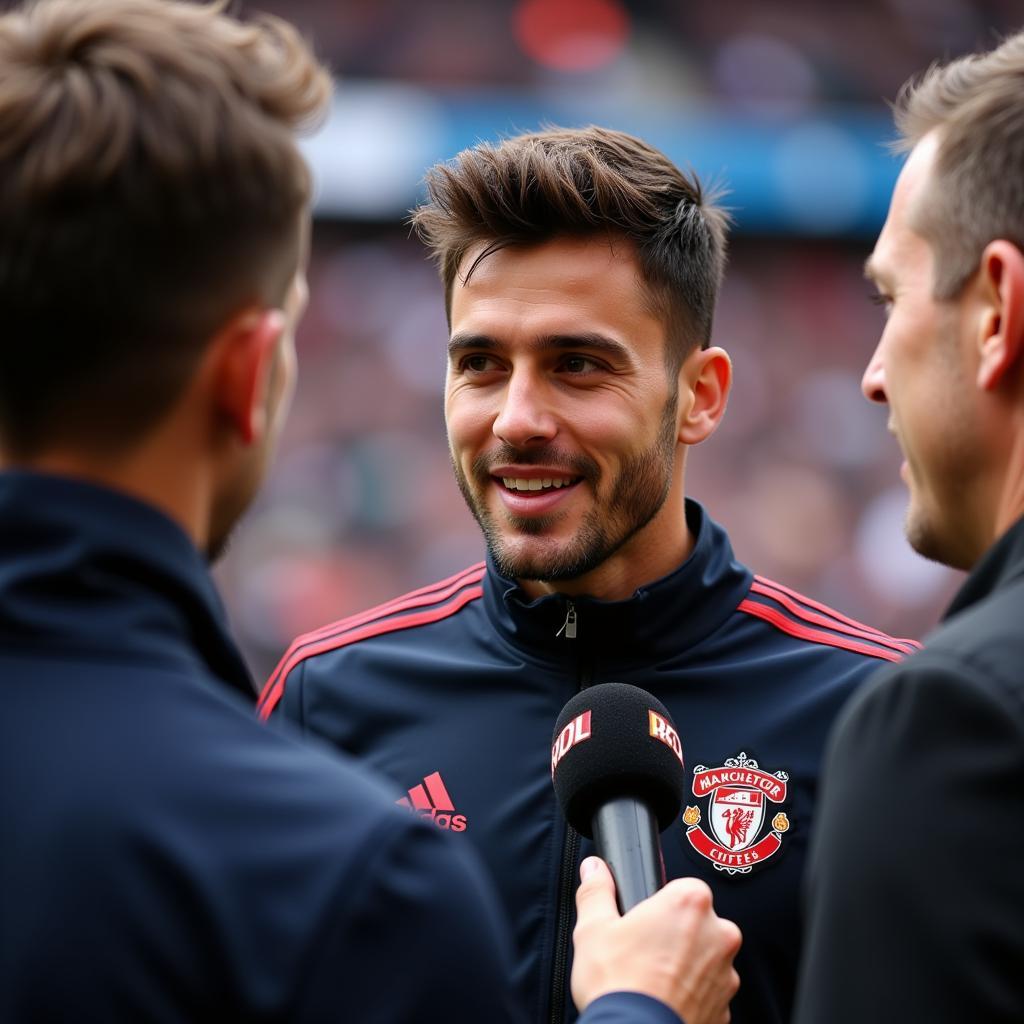The Eloquent Footballer: How Communication Skills Enhance Performance on and off the Pitch
October 12, 2024In the high-stakes world of professional football, where physical prowess and tactical acumen reign supreme, it’s easy to overlook the importance of communication. However, the ability to communicate effectively is a valuable asset for any footballer, from the dressing room to the pitch and beyond. While athleticism might grab headlines, it’s often the “eloquent footballer,” the one who can articulate thoughts, inspire teammates, and connect with fans, who achieves lasting success.
 Footballer giving an interview
Footballer giving an interview
The Power of Communication on the Field
On the field, communication is crucial for coordinating attacks, organizing defenses, and maintaining team cohesion. A well-timed shout or a clear hand signal can make all the difference in a fast-paced game.
- Building Understanding: Effective communication fosters understanding between teammates. When players can clearly articulate their intentions and expectations, it reduces misunderstandings and errors on the pitch.
- Enhancing Teamwork: A shared understanding of tactics and strategies, facilitated by clear communication, is fundamental to successful teamwork. Players who communicate well can anticipate each other’s movements and work together seamlessly.
- Boosting Morale: Positive and encouraging communication can boost team morale, especially during challenging moments. A few words of support from a teammate can inspire confidence and determination.
 Football team in a huddle
Football team in a huddle
Off the Pitch: Where Words Carry Weight
Beyond the green rectangle, communication skills are equally vital for a footballer’s professional and personal growth.
- Media Interactions: In today’s media-saturated world, footballers are constantly in the spotlight. The ability to handle interviews with confidence and articulate their thoughts clearly is crucial for shaping public perception and building a positive image.
- Commercial Opportunities: Eloquent footballers are more likely to attract lucrative sponsorship deals and endorsements. Brands seek individuals who can represent them well in public and connect with a wider audience.
- Personal Growth: Strong communication skills are essential for personal development, fostering self-awareness, empathy, and the ability to build meaningful relationships.
Cultivating the Eloquent Footballer
While some individuals may possess a natural flair for communication, it’s a skill that can be developed and honed over time.
- Active Listening: Paying attention to others, not just hearing their words, is fundamental to effective communication. It builds understanding and trust.
- Clear and Concise Language: Using precise language and avoiding jargon helps ensure that messages are understood by everyone.
- Non-Verbal Communication: Body language, eye contact, and tone of voice are as important as words themselves.
 Footballer interacting with fans
Footballer interacting with fans
“Communication is key, on and off the pitch,” says Dr. Emily Carter, a sports psychologist who has worked with elite athletes. “Players who communicate effectively can build stronger bonds with their teammates, manage their public image more effectively, and even navigate the challenges of their careers with greater resilience.”
Conclusion
The “eloquent footballer” is more than just a skilled athlete. They understand that communication is a powerful tool that can enhance performance, build relationships, and leave a lasting legacy. As the sport evolves, the ability to communicate effectively will become increasingly essential for footballers to thrive both on and off the field.
FAQs
- What are some examples of effective communication in football?
Clear instructions from a goalkeeper to their defense, a midfielder directing play with hand signals, and a captain delivering a motivating speech during halftime are all examples of effective communication in football. - How can I improve my communication skills as a footballer?
Practice active listening, focus on using clear and concise language, and pay attention to your non-verbal cues. Seek feedback from coaches, teammates, and mentors. - Why is it important for footballers to be articulate off the pitch?
In today’s digital age, footballers have a platform to connect with fans and shape public opinion. Being articulate allows them to express themselves authentically, advocate for causes they believe in, and build a positive brand.
Looking for more insights into the world of football? Check out these articles:
- Le Van Sy Player
- Player 8 Cheap
- Fastest Players FIFA Online 3
- Dreaming of Becoming a Footballer
- Which Players to Use in FIFA
Need Help?
Contact us at Phone Number: 0396443476, Email: [email protected] or visit us at 23 Thang 3, Dak Nia, Gia Nghia, Dak Nong, Vietnam. Our customer support team is available 24/7.